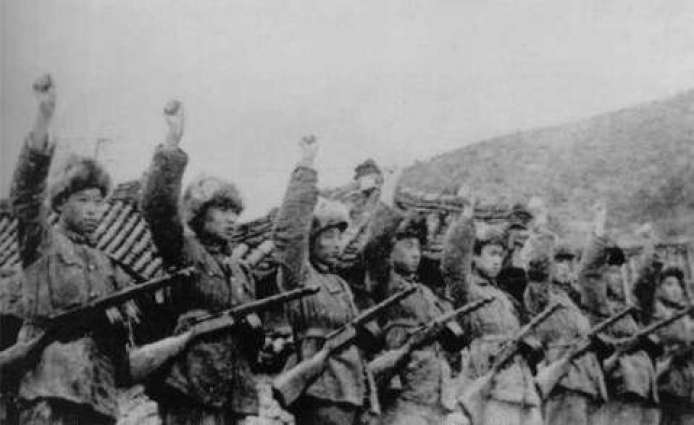Timofei Khryukin, who was among about 2,500 Soviet volunteer pilots participating in operations against the Japanese army in China since 1937, was twice awarded the title of Hero of the Soviet Union for his service in the Asian country
MOSCOW (Pakistan Point News / Sputnik - 07th May, 2020) Timofei Khryukin, who was among about 2,500 Soviet volunteer pilots participating in operations against the Japanese army in China since 1937, was twice awarded the title of Hero of the Soviet Union for his service in the Asian country.
The pilot's daughter, Natalya Khryukina, who is also the chairman of the association of descendants of volunteer pilots who fought in China from 1937 to 1940, spoke to Sputnik about her father's feat during the war.
During the first months after Japan's aggression against China in 1937, the Chinese air forces suffered heavy losses. At the request of the Chinese side, the Soviet Union began to provide military assistance to China, including by sending Soviet volunteer pilots, who were among the first to take part in battles against the Japanese occupying force. From 1937 to 1941, a total of 3,665 Soviet military specialists, including about 2,500 pilots and engineers, arrived in China.
Timofei Khryukin took part in the hostilities from March to August of 1938, serving twice in China, as he gained a reputation of being a competent aviation group commander. Prior to these events, Khryukin also fought in Spain from October 1936 to March 1937.
As a flying squadron commander, and then a group commander, Khryukin participated in 18 air missions to bomb Japanese warships and airfields. Four airfield bombings, several river crossing bombings and 14 Japanese warship bombings were carried out. With the personal participation of Timofei Khryukin, 54 Japanese aircraft, 34 ships on the Yangtze River and a Japanese aircraft carrier with about 30 fighters were destroyed.
BOMBING OF JAPANESE AIRFIELD IN WUHU CITY
In 1937, Wuhu city was occupied by Japanese troops. Given that the city had a large airfield, on which up to 60 Japanese fighters were based, it was chosen for a bombing attack that was conducted from a height of nine kilometers.
"Part of the Japanese fighters scrambled to meet the Chinese bombers. Initially, they gained height relatively quickly, but when they exceeded 6,000 meters, their agility fell in one moment. Neither the pilots nor the cars could approach at a distance of a shot. One could see how the fighters tried to climb toward us and quickly fell down. They were like a band of mutts barking at a passing car. We walked without paying any attention to them," Natalya said while citing the memories of her father.
As a result of the bombing, 12 I-96 fighters (Mitsubishi A5M) were destroyed and 23 others were badly damaged. Several bombs fell into a gasoline storage tank and large fuel reserves were burned. A total of 123 pilots and engineers were killed at the airfield.
Navy vessels that came from the sea along the Yangtze River posed a threat to the landing of troops, so the destruction of Japanese ships was of great strategic importance. As Khryukin recalled, Japanese ships were taken by surprise, since the raid was carried out from a concealed position.
"One ship, which was hit by three bombs at once, quickly dipped and tipped up. After that, as we recalled for a long time, the Japanese, panicking, jumped into the water overboard in their white suits. This ship sank quickly, the other two were badly damaged," Natalya said, recalling her father's memories.
DESTRUCTION OF AN AIRCRAFT CARRIER
In July 1938, a group of bombers led by Khryukin destroyed a Japanese aircraft carrier with a displacement of 14,000 tonnes.
"Three bombs hit the aircraft carrier. The first one hit the stern. The rear of the aircraft carrier fell off steaming. There was a hole instead of a stern. The second bomb hit the bow, and the third broke through the deck and exploded inside the ship. The aircraft carrier settled back and began to roll to one side. One of the 100-kilogram bombs hit the powder magazine of another ship. It sank almost instantly. It was a light cruiser guarding an aircraft carrier," Natalya said, reading out her father's memoirs.
"For his service in China, Timofei Khryukin was awarded the Order of Chiang Kai-shek. At a banquet, on a visit to the Generalissimo [Chiang Kai-shek], Timofei Timofeevich was officially introduced to his wife, a slender, pretty, elegant Soong Mei-ling, who gave my father diamond cufflinks," Natalya said.
The Soviet government highly valued the actions of Timofei Khryukin in China. He was awarded the title of Hero of the USSR and prematurely, bypassing the rank of major, was awarded the rank of colonel.




